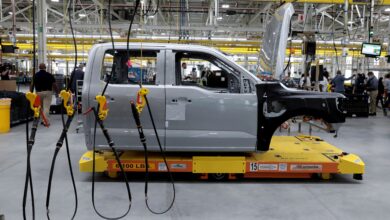GM, UAW may be near labor deal after negotiating session

Striking United Auto Workers (UAW) members from the General Motors Lansing Delta Plant picket in Delta Township, Michigan September 29, 2023.
Rebecca Cook | Reuters
DETROIT — Contract negotiations between the United Auto Workers and General Motors are reconvening midday Friday after intense talks occurred Thursday night and into the morning, according to sources familiar with the discussions.
The potential deal is being based on a tentative agreement the union reached Wednesday with Ford Motor and appears to be nearing the finish line, said three sources who agreed to speak on the condition of anonymity because the talks are private.
Both GM CEO Mary Barra and UAW President Shawn Fain participated in the marathon bargaining, however the union leader was doing so virtually, said two of the sources.
Fain was attempting to simultaneously negotiate with GM and Chrysler parent Stellantis, which were hosting talks with the union roughly 30 minutes from one another. Stellantis, including North American COO Mark Stewart, also held extensive talks overnight, two of the sources said.
Stellantis also appears to be closing in on a deal, however it was not immediately known when the sides would be reconvening.
The sources said the talks remain fluid and could change. Spokespeople with GM, Stellantis and UAW declined to comment on specific details of the talks.
Tentative agreements would likely put an end to six weeks of targeted labor strikes by the union after the sides failed to reach new deals before a Sept. 14 deadline. The union called back striking Ford workers once reaching an agreement with the automaker.
Ford’s deal included 25% pay increases over the term of the agreement, including an initial increase of 11%. The raises and benefits cumulatively raise the top wage to more than $40 an hour, including an increase of 68% for starting wages to over $28 an hour.
It also reinstated cost-of-living adjustments, reduced an eight-year path to top wages to three years and allowed the right to strike over plant closures, among other significantly enhanced benefits.
Any tentative deals still must be approved by local UAW leaders and then ratified by a simple majority of each automaker’s union-represented workers.
The progress came after contentious negotiations between UAW leaders, including Fain, and company executives, which saw thousands of union members walk out of plants and onto picket lines beginning Sept. 15.
The strikes have collectively cost GM, Ford and Stellantis billions of dollars in lost production. Ford said Tuesday that the union’s strike has cost it $1.3 billion and the deal, if ratified by members, would increase labor costs by roughly $850 to $900 per vehicle produced.
The proposed agreements are record-setting for the union, which was far more confrontational and strategic during the talks than in recent history.
The union initiated negotiations with all three automakers at once, breaking from recent history when UAW leaders would bargain with each automaker individually, select a lead company to focus efforts on and then pattern the remaining deals off a leading tentative agreement.
It’s not immediately clear how much the labor deals will increase labor costs for the companies, which had argued that giving in to all of the union’s demands would affect their competitiveness and even long-term viability.
Deutsche Bank recently estimated the overall cost increase of the agreement at Ford to be $6.2 billion over the term of the agreement; $7.2 billion at GM; and $6.4 billion at Stellantis.




